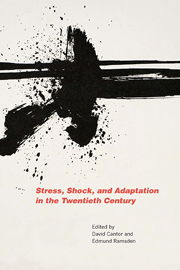Book contents
- Frontmatter
- Contents
- Acknowledgments
- Introduction
- Part One Packaging Stress
- Part Two Trauma and Acute Stress
- Part Three War
- Part Four Work
- Part Five Managing Stress
- 9 The Invention of the “Stressed Animal” and the Development of a Science of Animal Welfare, 1947–86
- 10 Memorial's Stress? Arthur M. Sutherland and the Management of the Cancer Patient in the 1950s
- Part Six Surveilling Stress
- List of Contributors
- Index
10 - Memorial's Stress? Arthur M. Sutherland and the Management of the Cancer Patient in the 1950s
from Part Five - Managing Stress
Published online by Cambridge University Press: 05 April 2014
- Frontmatter
- Contents
- Acknowledgments
- Introduction
- Part One Packaging Stress
- Part Two Trauma and Acute Stress
- Part Three War
- Part Four Work
- Part Five Managing Stress
- 9 The Invention of the “Stressed Animal” and the Development of a Science of Animal Welfare, 1947–86
- 10 Memorial's Stress? Arthur M. Sutherland and the Management of the Cancer Patient in the 1950s
- Part Six Surveilling Stress
- List of Contributors
- Index
Summary
Writing in 1952, Arthur M. Sutherland characterized the psychology of the cancer patient as “the psychology of a person under a special and severe form of stress in which many fundamental underlying emotionally charged convictions are brought to the surface.” Sutherland, a psychiatrist at Memorial Hospital in New York, was interested in how patients adapted to the disease and its treatment. In his view people responded to such stresses in ways that were maladaptive in that they undermined successful treatment and recovery. As he noted in the same 1952 article, “Stresses are often met postoperatively by avoidance or denial, or depression and dependence may develop which the patient may not be able to overcome without help.” In his view, professional persons, including the social worker, best addressed such problems.
I concentrate on Sutherland because his interest was quite different to that of the bulk of publications on stress and cancer in the 1950s. Whereas most focused on the role of stress as a cause of this group of diseases, or on the body's physiological responses to surgery, Sutherland was more concerned with how it affected people's behavioral and emotional responses to cancer and cancer treatments, especially in postoperative recovery. Put simply, for Sutherland stress offered a means of explaining a variety of emotional and behavioral responses to cancer and provided clues to managing these responses.
Today Sutherland is remembered as a pioneer in the development of what became known as psycho-oncology.
- Type
- Chapter
- Information
- Stress, Shock, and Adaptation in the Twentieth Century , pp. 264 - 288Publisher: Boydell & BrewerPrint publication year: 2014

